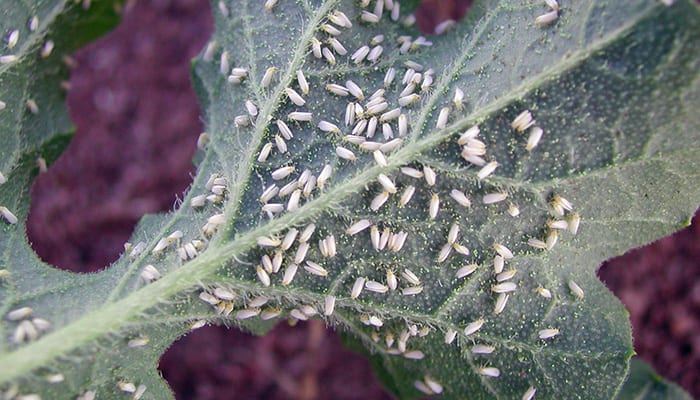News
Why the whitefly is such a formidable threat to food security

Adult whiteflies on a watermelon leaf (image courtesy of CSIRO)
Researchers have sequenced the genome of the whitefly (Bemisia tabici), an invasive insect responsible for spreading plant viruses worldwide, causing billions of dollars in crop losses each year.
The genome study, led by Associate Professor Zhangjun Fei of the Boyce Thompson Institute (BTI), offers many clues to the insect’s remarkable ability to resist pesticides, transmit more than 300 plant viruses, and to feed on at least 1,000 different plant species. Published today in the journal BMC Biology, the study will serve as a foundation for future work to combat this global pest.
“Whitefly is an economically important pest for agriculture crops. It causes direct damage and also is a major vector for viruses, like Tomato yellow leaf curl virus, Cassava mosaic virus and Cassava brown streak virus, so it creates huge crop losses and poses serious threats to food security, especially in Africa and other parts of the developing world,” said Fei.
In collaboration with a group of international colleagues, BTI researchers created a high-quality draft genome sequence of the whitefly and identified genes that code for proteins. The genome sequence can be accessed at the whitefly genome database developed by the Fei lab.
An analysis showed that, compared to related species, the whitefly has expanded families of detoxification genes. It also has extra genes that code for proteins related to virus acquisition and transmission, as well as insecticide resistance.
In an impressive example of horizontal gene transfer, the whitefly has acquired 142 genes from bacteria or fungi, including some coding for enzymes that break down foreign chemicals. These genes likely allow the whitefly to feed on diverse types of plants and to rapidly evolve resistance to insecticides.
Because pesticides are ineffective at keeping whitefly populations in check, collaborators at USDA plan to use the genome sequence to develop a control strategy using RNA interference (RNAi). Once scientists pinpoint the genes necessary for virus transmission and survival in the whitefly genome, they can develop new varieties of crops that will produce RNA molecules that block the expression of those necessary genes, killing the whitefly or preventing it from spreading the virus .
The genome will also be vital for mapping out genetic diversity in whitefly populations around the world. Whiteflies represent a group that is likely composed of a collection of species and subspecies, which may have implications for whitefly control. For example, the “superabundant” whitefly populations that are decimating cassava harvests in parts of Africa are a different variant from the insect sequenced in the current study, but sequence information generated here is aiding in the development of strategies for control of African whiteflies as well.
“The whitefly is among the top 100 invasive species in the world,” said Fei. “It’s everywhere.”
Additional BTI researchers on the project include co-first authors and postdoctoral researchers Wenbo Chen and Daniel Hasegawa; Cornell graduate students Patricia Valle Pinheiro and Angela Kruse; postdoctoral scientist Yi Zheng; visiting scholar Wenli Liu; bioinformatics analyst Honghe Sun; research specialist Yimin Xu; Professor Georg Jander and Assistant Professor Michelle Cilia. Collaborators include co-leaders Kai-Shu Ling and Bill Wintermantel from USDA-ARS, as well as Angela Douglas of Cornell, Judy Brown of University of Arizona, and Murad Ghanim of Israel.
Research reported in this news release was supported by grants from the USDA-ARS Area-wide project as a part of i5K initiative, the USDA-ARS Office of International Research Program from a grant provided by the USAID Feed-the-Future program (58-0210-3-012), the U.S. National Science Foundation (IOS-1110080, IOS-1109989 and IOS-1354309), USDA NIFA (2016-67013-24756), the Swedish Research Council, and the Israel Science Foundation.

